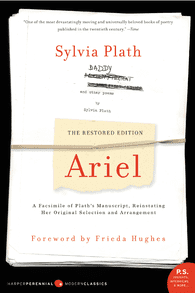Fifty years ago this spring, Sylvia Plath’s book "Ariel" was published posthumously in the United States. It sealed Plath’s reputation as one of the most innovative poets in the language. The voice in the poems is often aggressive, rude, and outrageously offensive. As writer Erica Wagner says, “We don’t often think of women speaking out in this way.” With “Ariel,” Plath opened a door for women poets coming after her to write with greater freedom in new emotional registers.
But Plath’s poetic achievement has always been overshadowed by her biography. Her troubled marriage to British poet Ted Hughes, her several suicide attempts, and her final successful attempt while her children slept in a nearby room have produced the literary equivalent of tabloid journalism: sensational articles and biographies, polemics, and wild speculation. Her life and death became a kind of screen for all kinds of heated cultural projections, with Hughes getting the worst of it. Some critics even suggested that, by having an affair, Hughes had essentially murdered Plath.
The paradox: no one would be interested in her life if her poems weren’t so good, but her poetry has often been read exclusively through the lens of her short, tragic life. This reductive way of reading the poems often narrows them into peepholes into the poet’s psychological issues, entirely missing the transcendent leaps they make.
Produced by Curtis Fox
Music Playlist
-
Sad Alron
Artist: Mark PritchardAlbum: Under the SunLabel: Warp Records -
Minor Nelson
Artist: The Claudia QuintetAlbum: Semi-FormalLabel: Cuneiform Records

